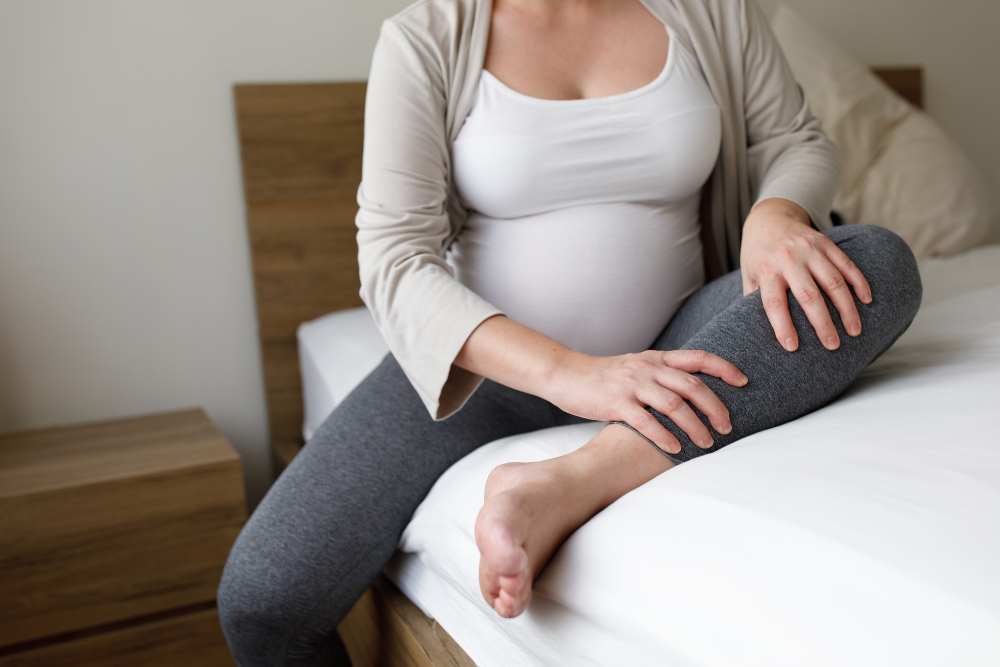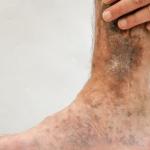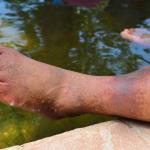
Topics Covered in this Blog
- Do Varicose Veins Go Away After Pregnancy?
- Here’s What to Do if Varicose Veins After Pregnancy Don’t Go Away
- When Can You Seek Treatment for Varicose Veins After Pregnancy?
- What Options Do I Have to Treat Varicose Veins After Pregnancy?
If you’ve recently been pregnant or had a baby, you may have developed a few health-related conditions and have questions now that the pregnancy is over. While these health-related issues may resolve themselves, it’s best to consult your doctor to get answers to your questions. One of these common issues may be varicose veins.
What causes varicose veins in the first place? Venous insufficiency, or varicose veins, occurs due to the extra strain the veins are under during pregnancy. They occur when the veins swell, and blood ends up flowing in both directions due to their increased size. The swelling of the veins may cause them to malfunction. Other signs of vein disease include swelling of the legs or feet, a feeling of heaviness in the legs, and pain or discomfort at the site of the varicose veins.
Varicose veins are common in pregnant women, affecting about 40% of all women during pregnancy. If you developed varicose veins during pregnancy, you might wonder if varicose veins after pregnancy will continue to be a problem or if they will go away on their own.
Do Varicose Veins Go Away After Pregnancy?
If you are wondering if varicose veins go away after pregnancy, we recommend visiting a vein specialist for a definitive answer. While it can take up to three months for postpartum varicose veins to potentially shrink or disappear, it is strongly recommended to make an appointment with a vein specialist. Your specialist will review your concerns and help determine the best course of action or treatment option.
Why do Veins Change During Pregnancy?
Pregnancy can cause many changes to your body, including your veins. All of your body’s systems work a little differently during pregnancy as they are not supporting just you, but your baby (or babies) as well. This includes your circulatory system, which pumps blood throughout your body.
During pregnancy, blood flow changes and moves differently throughout your body. A higher blood volume is produced to ensure you are healthy and your baby can grow. The extra blood volume causes your veins to work harder to move the blood between your heart and your extremities (and your placenta).
Problems can occur as your uterus expands and pushes on the largest vein in your body as the baby grows. This combination can cause veins to malfunction and blood pools in your legs, feet, and other areas, causing unsightly and possibly painful varicose veins.
Did Your Pregnancy Cause Your Varicose Veins?
Because of the increased blood flow in your body, your veins are under increased pressure to perform, especially in your legs. Hormones during pregnancy, as well as age and the pregnancy number, can also contribute to varicose veins. Women may get additional varicose veins with each pregnancy[1]. The increased blood flow causes your veins to expand and can cause varicosities in your legs, ankles, and feet. You can help alleviate the discomfort of varicose veins by remaining healthy during your pregnancy.
There are a number of contributing factors to varicose veins. Pregnancy ranks among the top five reasons why women develop venous disease. It is wise to speak with your family and your doctor about your medical history to determine if you are more likely to develop varicose veins. Age, lifestyle, and genetics can also be contributing factors when it comes to the development of varicose veins.
What are the Complications of Varicose Veins?
There are two main possible complications if varicose veins are left untreated. These are venous ulcers and blood clots. Blood clots could be potentially dangerous and should be treated right away.
Blood clots come in two primary forms. Superficial venous thrombosis (SVT) is the main type caused by varicose veins. These blood clots are surface blood clots that do not travel to the lungs. A more serious type of blood clot is deep vein thrombosis (DVT). DVT can form in severe cases of varicose veins and can be more dangerous.
If you notice any of the following, it is important to seek medical care immediately:
- The vein changes color
- Sores develop on the skin around the affected vein
- Your varicose veins develop a hard, rope-like quality
- The area around your varicose veins seems hot, painful, or tender
- Either leg swells a severe amount
Here’s What to Do if Varicose Veins After Pregnancy Don’t Go Away
Whether during or after pregnancy, it is recommended that you consult with a vein specialist to determine if you are indeed suffering from vein disease, also known as venous insufficiency (varicose veins). Speaking with a specialist will help you to set up a treatment plan at the right time if varicose veins after pregnancy are still a problem. They can also assist you with dealing with varicose veins during pregnancy as well.
Your minimally invasive varicose vein treatment will be handled in-office by one of our vein specialists. The focus of our specialists is to seal any diseased veins and reroute blood flow to healthy veins surrounding the diseased vein.
Treatment generally takes about one hour from start to finish. The procedure is outpatient, so time away from your baby is minimal. Many patients can return to normal activities immediately upon leaving the office.
When Can You Seek Treatment for Varicose Veins After Pregnancy?
Varicose veins can be uncomfortable and painful to deal with. It’s not possible to treat them while pregnant due to the increased blood flow in your body. If the veins were treated during pregnancy, the procedure may not work. After pregnancy changes occur to your body for several months as it readjusts to you no longer being pregnant.
While you may need to wait about six months before treating varicose veins after pregnancy, you can see a doctor to evaluate your condition before that time.
What Options Do I Have to Treat Varicose Veins After Pregnancy?
If you think treating varicose veins will involve painful surgery with a lengthy recovery, we want to set your mind at ease. While it’s not possible to treat varicose veins during pregnancy, it is possible to treat varicose veins after pregnancy. Treatments at USA Vein Clinics are conducted by professional vein specialists who offer minimally invasive, office-based treatments to meet your needs. Our treatments can improve or eliminate your symptoms. We offer over 100 locations nationwide.
Do varicose veins go away after pregnancy? If you have concerns or painful symptoms after pregnancy, consult with one of our vein specialists near you. Schedule an appointment online or give us a call at 855.768.3467.
[1] “Varicose Veins and Spider Veins.” Varicose veins and spider veins | Office on Women’s Health. Accessed October 17, 2022. https://www.womenshealth.gov/a-z-topics/varicose-veins-and-spider-veins.





